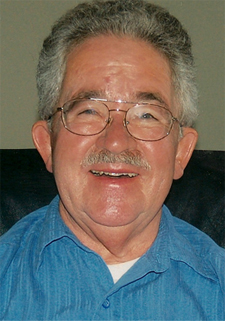In Memoriam: Clare 'Bud' McKanna
An accomplished scholar from humble beginnings passed away on March 25.

Historian and teacher Clare “Bud” McKanna died from chronic heart disease in his San Diego home on March 25, 2012. He was 76 years old.
A working man’s intellectual, Bud was a preeminent scholar of the American West. He taught classes in U.S., California, Native American and Latin American history at local community colleges and at San Diego State University in a career spanned 40 years.

Bud was a widely published “New Western” historian whose many articles and reviews appeared in such publications as the Journal of San Diego History, the Western Historical Quarterly, the Journal of American Ethnic History, the Pacific Historical Review, and American National Biography.
Honors and awards
Recipient of numerous grants and honors, Bud was awarded a major grant from the National Science Foundation as well as multiple fellowships from the National Endowment for the Humanities. A member of Phi Beta Kappa, Bud was also twice named the Most Outstanding History Teacher at San Diego State University, where he was a member of the History Department for 30 years.
A prosperous career
Bud’s teaching career in San Diego, which began in 1971 at Mesa College, was interrupted for several years when he was accepted into the doctoral program in history at the University of Nebraska-Lincoln, where he earned his Ph.D. in 1993. He was 57 at the time.
1997, Bud published his first book, "Homicide, Race, and Justice in the American West, 1880-1920." Four more books followed, most recently, including "Court-Martial of Apache Kid: The Renegade of Renegades (2009)." This last book reflects Bud’s lifelong interest in Native American history and his special expertise in the American Southwest. The Trial of “Indian Joe”: Race and Justice in the Nineteenth-Century West (2003) and White Justice in Arizona: Apache Murder Trials in the Nineteenth Century (2005) attest to Bud’s genius at documenting the legal and ethno-demographic complexities of capital cases, particularly in trials involving Native Americans.
One such trial was the sensational 1892 double murder trial of José Gabriel, who following his arrest was derisively referred to as “the Indian” or “Indian Joe” both in the courtroom and in the San Diego press. Judged guilty from the moment he was charged with killing an elderly farming couple in Otay Mesa, Gabriel was tried and convicted in San Diego with marked speed. Gabriel’s sole request upon learning that he was sentenced to die was that he “be hanged in the day time, not at night.” Just months after the trial ended, Gabriel became the first prisoner to be executed in San Quentin". Regarding Gabriel’s death, McKanna wrote, “It was José Gabriel who was executed on March 3, 1893; ‘Indian Joe,’ like all caricatures born of and thriving on prejudice, lives on.” Reviewing this book for the L.A. Times, Jonathan Kirsch aptly commented that this monograph “reads sometimes like a whodunit and sometimes like a courtroom thriller.”
Judith Keeling, editor-in-chief at Texas Tech University Press, which published Bud’s most recent books, pays eloquent tribute to his life and work: “Bud McKanna was a force for clarity and justice, his prime directives as a historian of the American West. His passion for setting the record straight was equaled only by his compassion for the disenfranchised, his enthusiasm for all compelling works that dare to turn misinformation on its ear, and his unflagging humor as a chronicler of the history unfolding all around him.”
At the time of his death, Bud McKanna and Richard W. Crawford were completing a book on San Diego’s historic Stingaree district. A recent tour of that district Bud organized for friends drew upon his expertise in homicide and his passion for local history. Bud liked to describe himself as a frustrated comedian, a view his friends would dispute. He called his memorable tour “A Walk on the Wild Side: Booze, Bawds, and Murder in the Stingaree.”
Early life
Born on September 24, 1935, in Lima, Ohio, Bud grew up in northwest Ohio farm country. His parents, Clare Vernon McKanna, Sr. and Dorothea Bragg McKanna, eventually gave up farming to move with their three sons to the nearby country town of Rushmore.
As a farm boy, Bud planted corn and tomatoes, slopped hogs, emptied 125-pound feed sacks into hog troughs, and stacked sacks of fertilizer onto wagons. As he explained in his memoirs, “only a farm boy” would call “living on a hog farm a great life.” Bud’s enduring respect for those who work with their hands continued in his father’s Rushmore garage, where Bud relished the lessons his father taught him about the mechanics of automotive repair.
Bud graduated from Sugar Creek Local High School in Vaughnsville, Ohio, in 1953. At his commencement, his paternal grandmother, Jennie, asked Bud if he had ever considered going to college. Her question was to alter the course of his life. As Bud recalled, until that moment, “The thought of going to college had never entered my mind.”
Following high school Bud worked in a factory and later joined the Army. He served in the Signal Corps and was posted to Thailand and Hawaii. Upon completing his enlistment, Bud moved to San Diego, his home for over fifty years.
Coming to San Diego
Once he was settled in San Diego, Bud remembered his grandmother’s question and enrolled at San Diego City College. He supported his studies at “City” by working night-duty as a records clerk for the San Diego Police Department. After receiving his AA, he was admitted to SDSU. Bud earned his bachelor's degree in social science in 1966 and his master’s in history in 1968.
Throughout his studies at SDSU and for many years afterwards, Bud worked as a mechanic at the Del Cerro Chevron Station near campus. Bud’s twenty-year employment at the gas station overlapped with his early years in teaching.
A sports enthusiast, Bud was an avid cyclist whose twenty-five-mile morning rides began well before dawn. He possessed an encyclopedic knowledge of football, baseball, and basketball, and organized his summers around the Tour de France. Ask him about the latest stage of The Tour, especially if he was sipping a glass of his cherished vintage Ficklin port, and a friend would be treated to a lesson about the mental and physical challenges associated with this grueling sport.
Bud was preceded in death by his parents, Clare V. McKanna, Sr., and Dorothea Bragg McKanna; by his brothers, Dennis and Earl; and by Earl’s son, Tom. He is survived by his sister-in-law, Reva McKanna, and his niece, Deborah Garner, of Mansfield, OH; by his uncle and aunt, Jay and Ruby McKanna, and his cousin Jule McKanna, of Ft. Jennings, OH; by cousin, Joe McKanna, also of Ohio; and by many grandnieces and nephews.
A private service to celebrate Bud’s life will be held later this month. In lieu of flowers, memorial gifts may be made to the California Room Collection, San Diego Public Library, 820 E Street, San Diego CA 92101 in memory of Clare V. McKanna, Jr.



